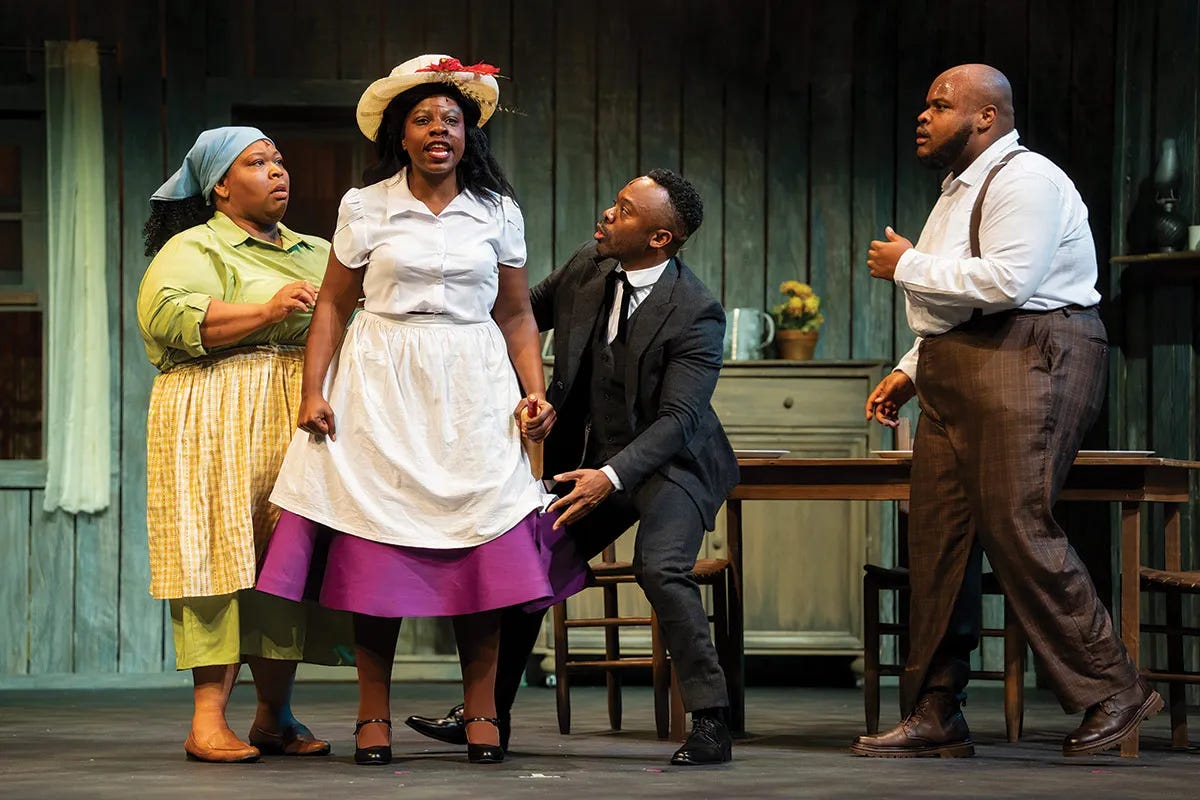Review: “Purlie Victorious” plays what it preaches
A repost of Maura's review in Charleston City Paper
It might seem incongruous to coax comedy from the Jim Crow-era South. Decades after gaining their freedom, Black Americans continued to confront seemingly insurmountable inequities. In so many ways, life on the plantation abided with those inequities.
But then there was Ossie Davis. Throughout his career, the actor, director and playwright from rural Georgia helped elevate the status of the Black dramatic artist from Broadway roles to television shows. And somehow, with all his obstacles, the celebrated civil rights activist was also able to take a wry view of some of the country’s enduring bad behavior.
After all, humankind behaving badly has long been prime terrain for satire. And in 1961 when his play Purlie Victorious: A Non-Confederate Romp Through the Cotton Patch ascended to the Broadway stage of the Cort Theater (now the James Earl Jones Theatre), it was known to prompt a chuckle from civil rights icons like the Rev. Martin Luther King Jr. and Malcolm X.

In 2023, the play returned to Broadway in an acclaimed revival starring Leslie Odom Jr. in the title role. As a Georgia preacher in search of a permanent pulpit, Purlie devises his own workarounds when a deck is stacked decidedly against him and his people.
Now, Charleston Stage brings the work to the Dock Street Theatre in a buoyant, bright new production directed by Henry Clay Middleton, a staple with the company. It will play there through Oct. 27.
Frederick Webb Jr. assumes the role of the wily man of the cloth who plots to wrangle back an inheritance after a cotton plantation owner, Ol’ Cap’n Cotchipee (Thomas Keating), snatches it from his expectant hands. His aim is nothing short of heaven sent, as he’ll use the money to reinvigorate Big Bethel Church, the sacred ground where his grandfather once preached.
To do so, he must first get up to a bit of chicanery, transforming the unsuspecting Lutiebelle Gussie Mae Jenkins (Facia Lee) to assume the identity of Bee, the rightful heir to the $500 fortune. That also brings in other members of the plantation, including Purlie’s brother Gitlow (Eddie Weaver); his wife Missy (Shanna Hastie); Cotchipee’s idealistic son Charlie (Sam Majors); and the all-knowing cook Idella (Letty Richey).
And so it goes down on the plantation, with plenty of oh-no-they-didn’t observations voiced by Purlie’s Black co-conspirators on navigating a White world. Those include how much fun it is to be Black when nobody’s looking, how much better they get along with White folks’ children than their own parents do, and how “the South is split like a fat man’s underwear.”
As identities are mistaken, and the bad guys look to get theirs, Purlie Victorious is the romp it promises to be, with markedly good-natured mirth that goes down easy. Charleston Stage’s ensemble inhabits the work well, with Frederick Webb Jr. leading the charge with preacherly charisma, while showing how he stoops to conquer. Facia Lee serves up fetching guilelessness as the sweet Lutiebelle, mooning over Purlie while awkwardly putting on the requisite airs to fill the fancy new frock needed to assume her new identity.
As Gitlow, Eddie Weaver seizes every chance to make humorous hay from a sycophantic yes man. Letty Richey similarly holds her own as the all-seeing cook. And Thomas Keating breathes pitch-perfect buffoonery into the appalling Ol’ Cap’n Cotchipee, a character that may well resonate with those presently monitoring media coverage of a modern-day oaf or two grasping tight to power and privilege.
All in all, Purlie Victorious takes its satirical swipes, but its barbs don’t cut terribly deep. It wades agreeably into this nation’s fraught terrain, as if it were a temperate Georgia pond. A gently farcical foray into upending ossified social orders, that approach perhaps helped vouchsafe its debut Broadway run.
In his sly confrontation, maybe Davis was channeling his own creation of Purlie, deploying considerable wits and smiling sleight of hand to land his Times Square pulpit. So to the playwright, and to this solid new production, I say “Preach.”




